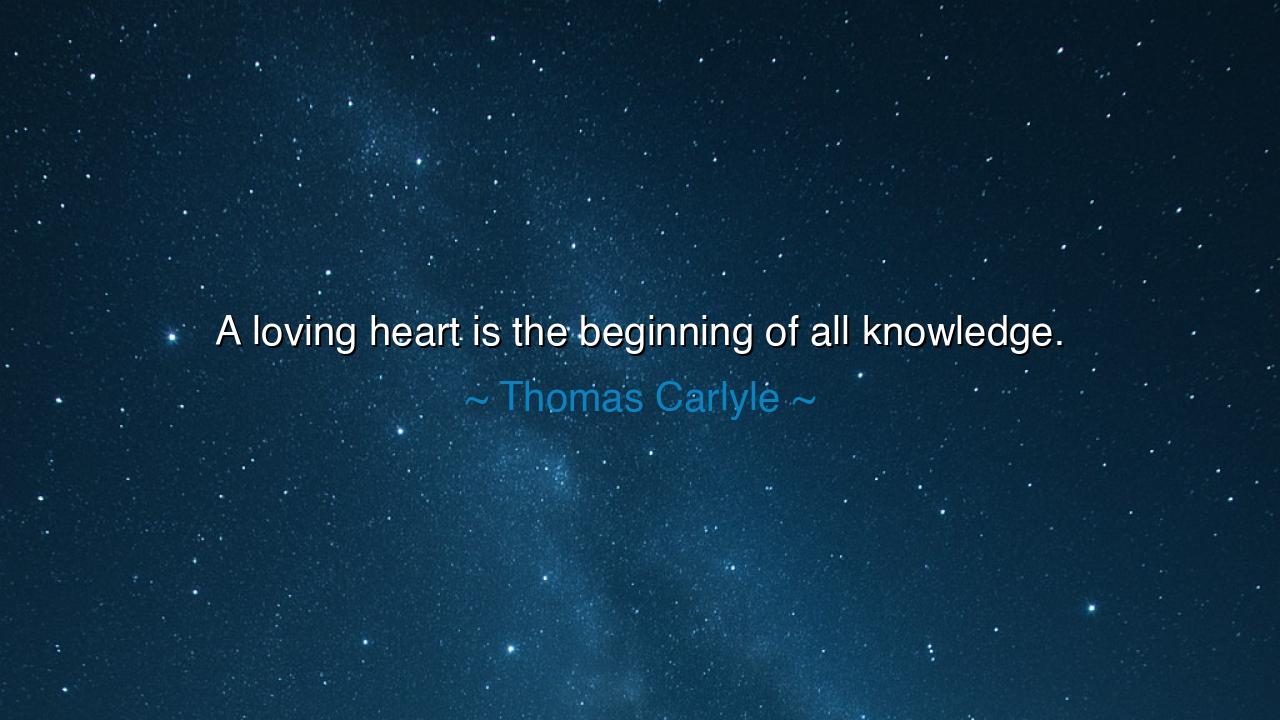
A loving heart is the beginning of all knowledge.






“A loving heart is the beginning of all knowledge.” Thus spoke Thomas Carlyle, the Scottish sage of the nineteenth century, whose writings sought to rekindle the soul of man in an age of machinery and material progress. In this single line, Carlyle distills the essence of wisdom — that true knowledge does not arise merely from the mind, but from the heart. For the intellect alone may see facts, but only love perceives truth. It is through a loving heart that we come to understand the world not as a collection of things, but as a communion of beings. Without love, knowledge becomes cold and proud; with love, it becomes living, luminous, and divine.
Carlyle wrote during a time of great upheaval — the Industrial Revolution, when machines thundered and men began to measure the worth of life in profit and progress. He saw that in this frenzy for invention and advancement, something precious was being lost: the tenderness of the human spirit. He sought to remind his readers that knowledge, stripped of compassion, is barren. To know truly, one must not only analyze but empathize; one must not only think but feel. For love is the light by which understanding sees most clearly. A man may learn the motions of the stars, the patterns of numbers, the anatomy of the body — but unless his heart is kind, he remains ignorant of the soul that animates it all.
“A loving heart,” Carlyle tells us, is not merely an ornament of character; it is the foundation of wisdom. The one who loves sees more deeply than the one who judges. The child who gazes upon a flower with wonder understands it more purely than the botanist who dissects it without awe. The teacher who loves his students will reach them in ways no textbook ever could. The scientist who loves truth will seek it not for glory, but for the good of mankind. Thus, love becomes the root of every form of real knowing, for it connects the knower to the known. To love something is to dwell with it, to listen, to see beyond appearances — and only then does knowledge become revelation.
Consider the life of Florence Nightingale, the Lady with the Lamp, who walked among the wounded soldiers of the Crimean War. She was not merely a nurse, nor merely a reformer — she was a woman whose loving heart opened the path to new knowledge. Her compassion led her to observe, to question, and to understand what others had ignored. From love came discovery — the principles of hygiene, the birth of modern nursing, the saving of countless lives. Her learning did not arise from ambition but from mercy; she saw suffering, and her love demanded that she learn how to heal it. Thus, Carlyle’s words find their proof in her life: love was the mother of her knowledge.
So too, my children, must you understand that knowledge without love is like a lamp without flame. It may hold the oil of information, but it cannot give light. The mind, though vast, is a barren field unless watered by the rains of compassion. The scholar who studies men without caring for them learns only their shadows. The leader who governs without love for his people rules by fear, not wisdom. Even in the smallest things, love opens the eyes. The artist who loves his subject paints with truth; the parent who loves their child teaches with patience; the friend who loves listens with understanding. Thus, every form of wisdom begins in affection — in the heart that is open, gentle, and ready to care.
But take heed, for this loving heart must be cultivated. It is not given freely to all; it must be chosen daily. It is easy to know much and love little, to grow clever and cynical, to mistake intellect for insight. Yet the wise guard their tenderness as the source of their strength. They forgive, they listen, they seek to understand rather than to conquer. For they know that in every creature, however small or broken, there lies something sacred — and to recognize that sacredness is the beginning of all true learning. Love, in this sense, is not weakness but vision: the power to see things as they are meant to be, not merely as they appear.
Therefore, let this be your lesson: if you would be wise, first learn to love. Let your knowledge grow not from pride, but from compassion. Approach every person, every task, every mystery with a loving heart, and the world will open its secrets to you. Seek not only to understand the mind of man, but his suffering; not only to grasp the laws of nature, but to revere her beauty. For in love lies both the seed and the harvest of wisdom. Thomas Carlyle reminds us that it is not intellect, but love, that makes us truly human — and that the heart, when open, becomes the doorway through which all true knowledge enters.
So go forth, children of thought and feeling alike. Be bold in learning, but gentle in spirit. Build your wisdom upon love, and your love upon humility. For when your heart burns with compassion, your mind will shine with understanding — and in that sacred union, you will discover what the ancients called enlightenment: the harmony of truth and tenderness, of reason and love, of knowing and being.






AAdministratorAdministrator
Welcome, honored guests. Please leave a comment, we will respond soon